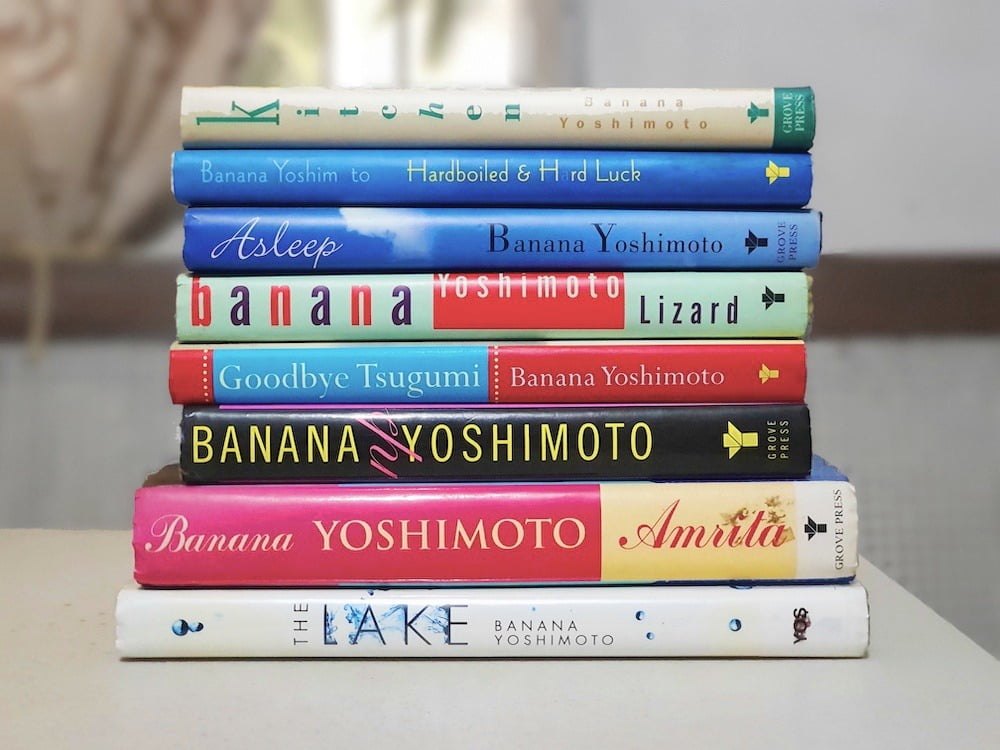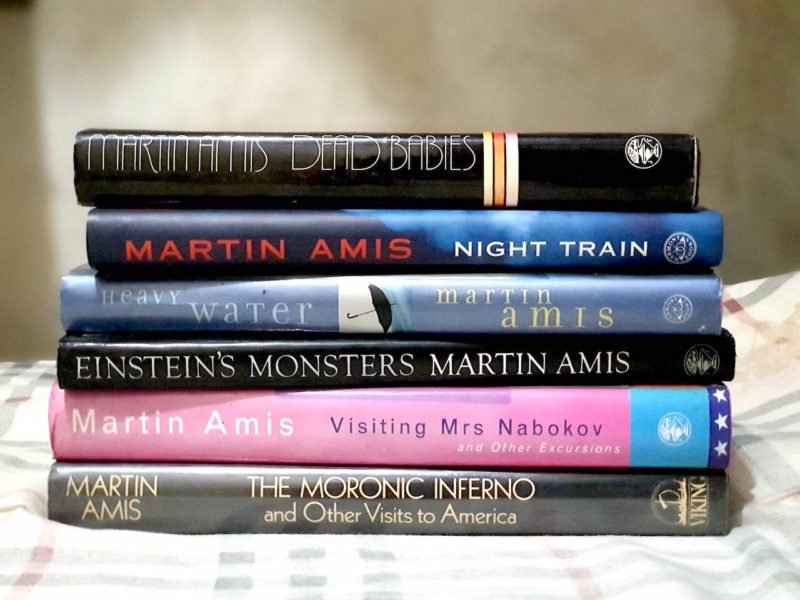[su_label type=”success”]Book Pile[/su_label]
[su_tabs]
[su_tab title=”Kitchen”]Originally published in Japan as Kitchin (1998). This edition published by Grove Press, New York (1993), translated by Megan Backus. Jacket design by Adriane Stark, jacket photograph by Sigrid Estrada. Hardcover, 153 pages[/su_tab]
[su_tab title=”Hardboiled & Hard Luck”]Originally published in Japan as Hādoboirudo by Rockin’ On, Inc. (1999). This edition published by Grove Press, New York (2005), translated by Michael Emmerich. Jacket design by Gretchen Mergenthaler, cover painting by Yoshitomo Nara. Hardcover, 149 pages[/su_tab]
[su_tab title=”Asleep”]Originally published in Japan as Shirakawa yofune (1989). This edition published by Grove Press, New York (2001). Jacket design by Charles Rue Wood, jacket illustration by Paul D’Innocenzo. Hardcover, 177 pages[/su_tab]
[su_tab title=”Lizard”]Originally published by Shinchosha, Japan as Tokage (1993). This edition published by Grove Press, New York (1995), translated by Ann Sherif. Jacket design by John Gall, jacket photograph by Gen Nishino/Photonica, illustration of lizard by Marc Burckhardt. Hardcover, 261 pages[/su_tab]
[su_tab title=”Goodbye Tsugumi”]Originally published in Japanese (1989). This edition published by Grove Press, New York (2002), translated by Michael Emmerich. Jacket design by Charles Rue Woods, jacket photograph by Rebecca Floyd/Graphistock. Hardcover, 186 pages[/su_tab]
[su_tab title=”N.P.”]Originally published by Kadokawa Shoten, Japan (1990). This edition published by Grove Press, New York (1994), translated by Ann Sherif. Jacket design by Rick Pracher, jacket photographs by Sigrid Estrada. Hardcover, 194 pages[/su_tab]
[su_tab title=”Amrita”]Originally published in Japan (1994). This edition published by Grove Press, New York (1997). Jacket design by Rue Woods, jacket artwork by Michael Tedesco, jacket photograph by Susan Daboll. Hardcover, 367 pages[/su_tab]
[su_tab title=”The Lake”]Originally published by Foil Co., Ltd., Japan as Mizuumi (2005). This edition published by Melville House Publishing, New York (2011), translated by Michael Emmerich. Jacket design by Christopher King. Hardcover, 188 pages[/su_tab]
[/su_tabs]
Kitchen
Kitchen (1993) by Banana Yoshimoto is a heartbreaking and contemplative novella that examines themes of loss, grief, and the healing power of human connection. The plot focuses around Mikage Sakurai, a young lady who seeks peace in the kitchen following the loss of her grandmother, her sole family. As she navigates the loneliness and emptiness that follow her loss, Mikage gets drawn to the soothing and familiar routines of cooking. The kitchen becomes a symbol of stability and warmth, a place where she may find consolation and a sense of belonging.
However, the narrative takes a twist when Mikage finds herself taken in by a kind-hearted and quirky transgender lady named Yuichi. Through their unorthodox bond, Yoshimoto examines the intricacies of relationships and the transformational power of love. As Mikage continues to build relationships with Yuichi and her family, she realizes that healing and resilience may be found in unexpected places. Kitchen dives into the subtleties of mourning and the quest for purpose in life, eventually underscoring the significance of finding consolation in the relationships we establish with others, even in the face of loss.
Hardboiled & Hard Luck
Hardboiled & Hard Luck (2005) consists of two discrete stories, making up the two sides of the book’s title. Both of the stories deal with the grief of loss, with each narrative appearing like a touching farewell as the narrators of each story reflect on their experiences.
In “Hardboiled,” an anonymous narrator traverses the mountains on the anniversary of her ex-lover’s death, grappling with her troubled past and seeking solace in the face of loss. As a lone wanderer, she stumbles upon a peculiar shrine and is led to a hotel, where a series of extraordinary occurrences unfold, leaving her forever changed.
In the poignant tale “Hard Luck,” a young woman grapples with her sister Kuni’s coma. As she confronts the heartbreaking prospect of bidding farewell to her beloved sibling, a glimmer of hope emerges when Kuni’s fiancé departs, but his brother persists in his visits. It becomes evident that the protagonist of the story has caught his attention, setting the stage for a potential new connection amidst the backdrop of tragedy.
Asleep
Asleep (2000) is a compelling book consisting of three interconnected chapters that explore the themes of sleep, dreams, death, and complicated relationships. The first narrative follows Shibami, whose brother and cousin become lovers before a sad death, illustrating the consequences of loss and hidden truths. The second narrative is about Fumi, suffering from alcohol addiction, who realizes her love for a lady from her past after her death. Lastly, Terako establishes a relationship with a guy whose wife is in a coma and finds peace in her connection with the spirit of his wife following her best friend’s death. These stories delve into deep slumbers, unfulfilled passions, and unforeseen links between the living and the dead.
Lizard
This collection of short stories by Banana Yoshimoto offers a captivating exploration of young angst in contemporary Japan. Delving into the lives of its characters, the stories delve into their attempts to overcome their painful pasts and the profound impact these experiences have on their current relationships. The themes of infidelity and uncertainty are skillfully handled, portraying them as integral components of the characters’ growth and learning process. Ultimately, Lizard (1995) conveys a message of refusing to let the past haunt one’s present, instilling a sense of hopefulness in its readers. In her afterword, Yoshimoto discusses the themes of healing, karma, fate, and the unpredictable nature of encountering hope.
Each story in the collection unfolds with a spare, quizzical, and highly conversational style, drawing readers into the characters’ lives as they encounter peculiar coincidences and undergo spiritual epiphanies while navigating crucial turning points in their existence. In the title story, a man manages to salvage his relationship with his enigmatic lover, a reclusive acupuncturist with mysterious healing powers he fondly calls Lizard. Their journey to an ancient temple, coupled with the revelation of unsettling childhood secrets, becomes the catalyst for rejuvenation and growth in their bond.
Goodbye Tsugumi
Goodbye Tsugumi (2002) by Banana Yoshimoto takes readers on a captivating journey through the intricate bonds of an unconventional friendship between two female cousins. Set in a sleepy Japanese coastal town, the story unfolds during the final summer the cousins spend together. Tsugumi, who resides in a small seaside inn, is the center of attention around whom everyone treads cautiously, fearing her ill-humored reactions. Maria, on the other hand, endures Tsugumi’s pranks and acerbic remarks, often feeling hurt by her cousin’s words. However, despite Tsugumi’s flaws, Maria’s fascination with her remains intact.
Yoshimoto skillfully weaves together the contrasting personalities of Maria and Tsugumi, creating a compelling narrative that delves into themes of loyalty, acceptance, and personal growth. As readers embark on this offbeat journey, they are invited to witness the evolving dynamics between the two cousins and unravel the profound impact they have on each other’s lives.
N.P.
N.P. (1994) by Banana Yoshimoto is a captivating novel that delves into the realms of subtlety, magic, and mystery. It follows Kazami Kano, the girlfriend of a translator who committed suicide while working on a collection of stories written in English called “N.P.” The curse surrounding the book emerges as every translator attempting to translate the ninety-eighth story meets a tragic end. Kazami’s journey unfolds as she navigates the task of translating “N.P.” while becoming entangled with the writer’s children, Saki and Otohiko. Through their intertwined lives and the discovery of additional stories, Kazami uncovers shocking truths and develops a belief that the chaotic beauty of life can be simultaneously awe-inspiring and maddening.
Set in Tokyo, the novel explores Kazami’s past relationship with the translator and her reconnection with the Takase family. As she delves deeper into the untranslated book, she realizes the profound connection between her own life and the Takases, with a former girlfriend of the late translator holding the key to their bond. N.P. is a thought-provoking exploration of loss, connection, and the transformative power of literature. It challenges conventional perceptions and leaves a lasting impression by depicting the haunting beauty that can emerge from tragedy.
Amrita
Amrita (1997) by Banana Yoshimoto is a thought-provoking novel that explores the themes of memory loss, grief, and self-discovery. The story revolves around Sakumi, who loses her memory after a tragic accident. With the help of her sister’s former lover and clairvoyant brother, Sakumi embarks on an emotional journey to regain her identity and make sense of her sister’s suicide. Yoshimoto’s skillful blend of Buddhist philosophy and everyday wisdom adds depth to the narrative, but some readers may find the intricate structure less compelling as the story progresses.
Renowned for her heartfelt portrayals of young Japanese lives, Yoshimoto once again displays her storytelling prowess in Amrita. The novel takes readers on a poignant expedition through grief, dreams, and shadows as Sakumi navigates her way toward transformation and self-discovery. Despite some limitations in the later part of the book, Yoshimoto’s ability to create relatable narratives and explore profound human experiences shines through in this touching tale of memory, loss, and the search for meaning.
The Lake
The Lake (2015) by Banana Yoshimoto is a sad story inspired by the Aum Shinrikyo cult, notorious for their devastating Tokyo subway attack. The narrative follows a young woman who goes to Tokyo to recover from her mother’s death and pursue her creative aspirations. While peering out of her window, she makes a connection with a young man across the street, leading to a hesitant relationship. However, her discovery of his childhood trauma and her subsequent inquiry into a religious cult’s participation lead to a fascinating story about the tenacity of the human spirit in the midst of tragic experiences.
As the two heroes face their traumatic pasts, they find consolation and optimism in the calm of a rural lake. Yoshimoto’s superb narrative and contemplative writing make The Lake a strong and emotionally engaging book that asks readers to ponder the transformational power of love and the intricacies of the human experience.
Memorable Quotes
The place I like best in this world is the kitchen. No matter where it is, no matter what kind, if it’s a kitchen, if it’s a place where they make food, it’s fine with me. Ideally it should be well broken in. Lots of tea towels, dry and immaculate. White tile catching the light (ting! ting!).
Opening paragraph, Kitchen by Banana Yoshimoto
Time expands and contracts. When it expands, it’s like pitch: it folds people in its arms and holds them forever in its embrace. It doesn’t let us go very easily. Sometimes you go back again to the place you’ve just come from, stop and close your eyes, and realize that not a second has passed, and time just leaves you there, stranded, in the darkness.
Page 24, Hardboiled & Hard Luck by Banana Yoshimoto
I really believe that no matter how old people get, they tend to change in certain ways depending on how people treat them—they change their colors.
Page 91, Asleep by Banana Yoshimoto
Thinking about it now, I realize that a strange, invisible kind of pressure had taken control of me then, a pressure to conform. It’s like when you go out to a restaurant with a group of friends and you plan to all split the bill evenly, you can’t very well order a whole meal for yourself if everyone else is just having a cup of coffee. Just like you’re obliged to go on company trips, even if you don’t want to. Your superiors will look down on you if you don’t. That’s the way the world works.
Page 74, Lizard by Banana Yoshimoto
Each one of us continues to carry the heart of each self we’ve ever been, at every stage along the way, and a chaos of everything good and rotten. And we have to carry this weight all alone, through each day that we live. We try to be as nice as we can to the people we love, but we alone support the weight of ourselves.
Page 39, Goodbye Tsugumi by Banana Yoshimoto
My way of looking at the world is so nearsighted. If no one said anything, I’d probably just live like I do now year in and year out, and feel complacent about everything around me. Plus, I don’t see that many people. Something is definitely missing—I don’t know what, maybe compassion for people who are suffering, a sense of adventure, interest in other people…. Yeah, so I really feel for you.
Page 74, N.P. by Banana Yoshimoto
Sometimes when I met other people my thoughts were brought together, and within the past we had created together I was able to find myself. It was a relief to have access to that knowledge. That’s why it was so hard to see people go. Whenever I was ready to say good-bye to someone, I was overcome by an indescribable angst.
Page 61, Amrita by Banana Yoshimoto
Like the feeling you get when you realize that, in the grand scheme of things, your time here on this earth really isn’t all that long after all.
Page 131, The Lake by Banana Yoshimoto
AUTHOR PROFILE
Banana Yoshimoto, born Mahoko Yoshimoto on July 24, 1964, is a popular Japanese novelist noted for her distinctive storytelling style and study of love, grief, and the human condition. She has distinguished herself in writing with her pen name, chosen because she deemed it androgynous and also because of her love for banana flowers.
Yoshimoto was born and raised in Tokyo, Japan, and her exposure to art and literature from an early age greatly influenced her creative sensibilities. She studied literature at Nihon University’s Art College, where she developed her passion for writing and honed her craft. Her first published work, the novella Kitchen, gained immense popularity and critical acclaim, establishing her as a prominent voice in Japanese literature.
Yoshimoto’s writing style is often characterized by its simplicity, elegance, and introspective nature. Her stories seamlessly blend elements of contemporary fiction with a touch of magical realism, creating a dreamlike atmosphere that captivates readers. She explores universal themes of loneliness, grief, and the pursuit of happiness with a delicate and compassionate touch.
While some critics have argued that her works do not fit the traditional mold of literary fiction, it is precisely this departure that distinguishes them from her reputation as a popular author.
Her works have been translated into numerous languages, expanding her global readership and earning her international recognition. She has been the recipient of several prestigious literary awards, including the Kaien Newcomer Writers Prize and the Izumi Kyōka Prize for Literature.
Further Reading
Banana Yoshimoto’s Improbable Literary Journey From Waitress to Writer by Cassie Wong, Culture Trip
Hip novelist combines old and new Japan by Nicole Gaouette, The Christian Science Monitor
How the English Language Failed Banana Yoshimoto by Eric Margolis, Metropolis
Banana Yoshimoto Interview by PP Wong, Banana Writers





